
Charles Melton in Warfare
WARFARE
Just about the last words heard in writer/directors Ray Mendoza's and Alex Garland's stomach-knotting military thriller Warfare come from a traumatized Iraqi who can only exclaim one question, in English, at the American soldiers who have taken over her home: “Why?! Why?!?”
It's fitting for the moment, as the woman's family, the film's audience, and even the on-screen troops likely have equally little concrete understanding of what precisely the U.S. Navy SEALs are doing there. Yet “Why?” is also an appropriate query regarding the movie's very existence. Technically virtuosic and undeniably gripping, Mendoza's and Garland's achievement seems to raise the bar in terms of realistic depictions of wartime atrocities, and that bar was already set awfully high. But while Warfare isn't fun, nor is it meant to be, I also didn't find it satisfying … though the notion persists that it isn't meant to be that, either. Which brings us back to that opening question: Why? If we can't glean our protagonists' mission beyond “get out alive,” and don't feel anything at the finale beyond relief that it's over, why are we watching in the first place? Why is this a movie?
Certainly, there are more craven reasons to make and release a film than wanting/needing to expose viewers to the horrors of combat. And it takes a special kind of bravery to spend roughly half your movie exposing them to the drudgery of combat the way Warfare does. A 95-minute reenactment of a single encounter experienced by Navy SEAL Mendoza and his platoon on November 18, 2006, this Iraq War drama takes place almost solely in one occupied multi-story house, a domicile in which American snipers, gunners, and communicators monitor the activities of a presumably artillery-heavy neighborhood. Barring the introductory sight of our troops hooting to Eric Prydz's “Call on Me” music video – the film's sole nod toward lightheartedness, so enjoy it while you can – we spend roughly 45 minutes with the team as they secure the house (and detain, by gunpoint, the numerous families within), monitor the perimeter, communicate with their base via radio, and watch surveillance footage. Then, around Warfare's halfway point, a grenade is thrown into the house, that detonation quickly followed by an IED exploding outside, and from then on we're really no longer in Iraq. We're effectively in Hell.
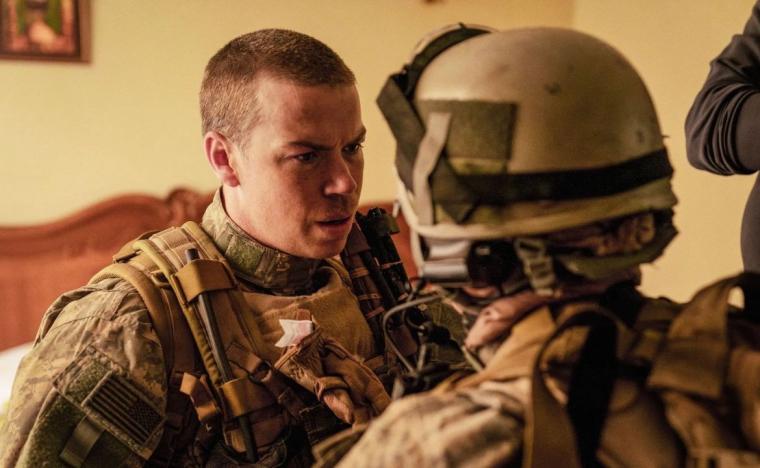
In many ways, Warfare is easier to praise for what it doesn't do than for what it does, principally in its extended pre-combat prelude. During that unexpectedly charming “Call on Me” opener, with cinematographer David J. Thompson making a point of focusing on each of the grinning, laughing troops we'll never see grin or laugh again, we can reasonably expect to get to know the individual members of Navy SEAL team Alpha One. To be sure, from the start, we already know some of their faces from movies and TV: Emmy nominees D'Pharaoh Woon-A-Tai (playing Mendoza) and Will Poulter; Heartstopper Kit Connor; James' son Michael Gandolfini; Beatle-to-be Joseph Quinn. (The role of lead sniper Elliott Miller, to whom the film is dedicated, is played by Cosmo Jarvis, and after this and De Niro's gangster saga The Alto Knights, I'm now zero-for-two at recognizing Jarvis on-screen in 2025 – this after watching Shōgun, in which he was in every episode and, like, the only Caucasian around.) Interestingly, though, we don't get to know the troops, and that turns out, at least initially, to be less of a bug than a perk.
No matter how artful, combat pictures tend to turn their soldiers into instantly recognizable types: the sane, stalwart leader; the hothead; the comic relief; the gruff veteran; the kid who'll inevitably crack under pressure. Those familiar characters are only clichés, however, because of the situations and dialogue that establish them as such – situations and dialogue that Mendoza and Garland steadfastly avoid. None of the Alpha One SEALs here recounts any personal backstory, none of them engages in conversation or behavior that gives away temperamental leanings … . We don't even know whether any of the guys are truly friends or merely (make that “merely”) dedicated professionals servicing their mission and country the best they can.
Thank God for that. You may miss some of the pleasures of prototypical combat movies in the lack of overt personality on display, and I'll admit that despite the troops' disparate looks, it was routinely hard to tell them apart. (Rather than recalling character names, you tend to remember Wartime's distinct SEALs as “that dude with the mustache” or “that guy from The Bear.”) But I was happy to take the relatively interchangeable quality of our protagonists given that it led to a welcome lack of sentimentality and narrative-driven manipulation, as well as some genuine surprises. The moment you see Connor's sweet, sweaty mug, you imagine he'll be the team's token weak link, its Jeremy Davies in Saving Private Ryan, just as you imagine Poulter to be its Tom Hanks. Neither presumption proves correct.
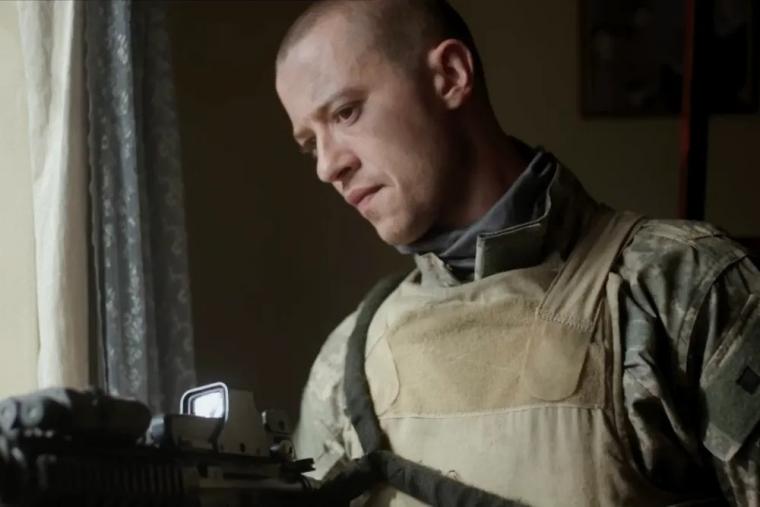
Yet there's a downside to Mendoza's and Garland's antiseptic approach, because it also applies situationally. As most of the talk, either spoken in the house or heard through the radio, is restricted to military jargon, this lifelong civilian found it difficult to comprehend anyone's mission orders. This isn't necessarily a knock, considering the linguistic shorthand added to the realism, and everyone's goals were generally clear. But after that first grenade explodes, and for the rest of the movie's length, it becomes increasingly evident that there's no real story to follow, and because we've been primed to view the SEALs as one collective, faceless unit, there's no particular investment in anyone's fate. (An IED scatters one troop's body parts throughout the street, and despite an end-credits postscript, I still have no idea who the victim was.) Although Mendoza and Garland are to be commended for their “just the facts” presentation, they've gone perhaps too far in that direction, removing narrative and emotional involvement entirely in favor of an immersive experience that's almost numbing in its view of the confusion and pain of war. War-time realism and war-time storytelling, on screen, don't have to be mutually exclusive, as The Hurt Locker proved 16 years ago, and other works have proved before and since. Wartime itself, though, is honest to a fault. At times, the movie feels like Garland's apology for making last spring's Civil War so comparatively easy to sit through.
One actor has to spend a half-hour shrieking in unimaginable pain. Another spends the same amount of time either blessedly unconscious or exerting heavy groans at the agony of losing his legs. The sound design, which is admittedly exquisite, is a pummeling source of tension when it isn't freakishly disorienting. The panic exhibited by the universally exceptional acting ensemble is nearly visceral. The treatment of the Iraqi families, when the SEALs remember they're around, is abhorrent (as was obviously intended by the filmmakers) – not just for the cruelty inflicted, but for how irrelevant they are to the Americans' mission. And what, in the end, is all this trauma and misery in service to? A statement on how the Iraq War was wasteful and pointless and endless? Proof that, contrary to widespread opinion, you actually can make a war movie that doesn't glamorize combat? A testament to the courage of Mendoza's Alpha One team – one possibly not wanted by his fellow SEALs, given how nearly all of their faces are blurred out in the end-credits salute? Warfare has technical acumen by the truckload and vérité for days but, sadly, almost nothing in the way of fresh insight or evident reason for being – not even the perfectly benign, perfectly legitimate excuse of delivering a movie people might actually want to see. Scene by scene, this is a stunning achievement I couldn't escape fast enough. It's a guilty displeasure.
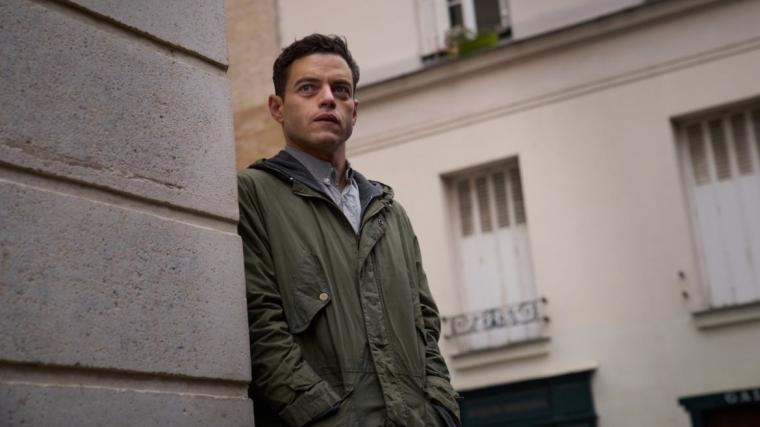
THE AMATEUR and DROP
There are really only two types of ludicrous Hollywood thrillers: the type that spends most of its time trying to convince you it's not ludicrous, and the type that essentially says “F--- it, we all know this is beyond silly, so why don't we have some fun with it?” Director James Hawes' The Amateur is the first kind – a professionally rendered, conspiracy-minded globe-trotter with a cast of Oscar, Emmy, and Tony winners that, every so often, delivers some generic excitement and a minor giggle. Director Christopher Landon's Drop is the second kind – a less-polished trifle that's nonsensical from minute one and simply wants to give audiences a meaningless good time. Guess which one I preferred.
That's not to say that I didn't largely enjoy myself at The Amateur, even if knowing that squirrelly Rami Malek was the lead initially made me as reflexively twitchy as … . Well, as Malek himself in his every screen appearance. Here, the onetime Freddie Mercury and Mr. Robot plays CIA cryptographer Charlie Heller, an unappreciated cyber-nerd who loses his shit when his beloved wife Sarah (Rachel Brosnahan), newly arrived in London, is killed in a terrorist attack. Upon learning that his superiors (Holt McCallany and Danny Sapani) have little interest in investigating the case, and for potentially treasonous reason, Charlie takes it upon himself to hunt down the four people responsible for Sarah's death, having been given a soupçon of special-ops training by CIA enforcer Robert Henderson (Laurence Fishburne). With the film based on Robert Littell's 1981 novel, and screenwriters Ken Nolan's and Gary Spinelli's adaptation frequently as moldy as most spy-thriller relics of the Reagan era, its hook is that Charlie uses his computer know-how to exact revenge, as he's constitutionally unable to shoot someone point-blank and physically incapable of winning a fistfight. Most of his executed killings, though, are off-the-charts ridiculous. It was way more entertaining when Charlie approached a locked door and taught himself to open it through a lock-picking tutorial posted on YouTube.
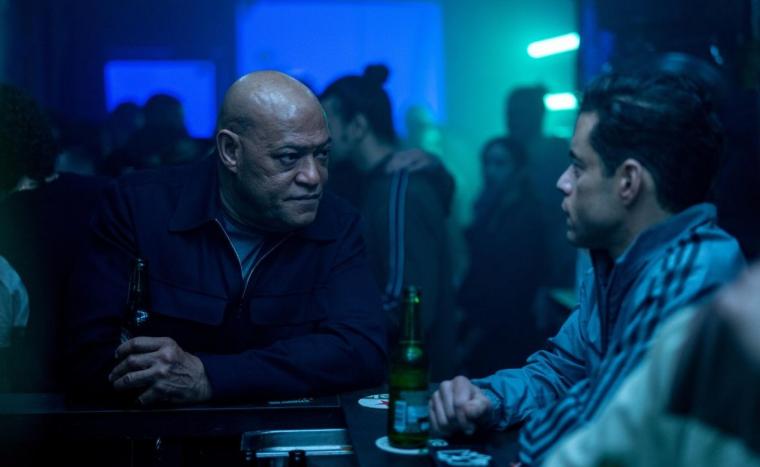
If only all of Hawes' movie were updated in this so-goofy-it's-perfect manner. Unfortunately, I think we're actually meant to take seriously Charlie's Bond-villain shenanigans when he poisons an operative at her allergy clinic by filling her hypobaric chamber with pollen (!!!), or when, in a scene heavily promoted in the trailers, he implodes another goon's skyscraper-high swimming pool. Sequences such as these don't defy belief so much as puree it. And considering the tonal gravitas of Charlie's grief-fueled revenge, it would've been nice to have been filled in on practical matters. Like, say, how the guy travels from Paris to Madrid to Romania without alerting the CIA agents on his tail, and without an expense account.
Yet if you accept The Amateur, with its refreshingly minimal dawdling, as an agreeable throwaway and not an attempt to replicate the success of the Jason Bourne franchise, it's passably amusing. Malek is just weird and off-putting enough to make for a distinct genre protagonist – the movie is probably more watchable with him in the lead than it would've been with any of the famous Ryans or Chrises – and beyond the aforementioned parenthetical talents, we're also treated to appearances by Catríona Balfe, Julianne Nicholson, Michael Stuhlbarg, Adrian Martinez, Shōgun's Takehiro Hiura, and Jon Bernthal, the latter playing a CIA operative nicknamed “The Bear.” Where oh where did Hawes find the inspiration for that casting choice?!
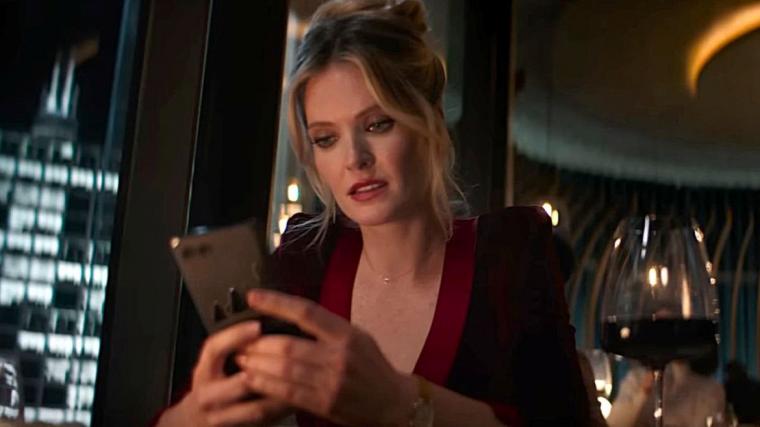
All told, I liked The Amateur just fine. I loved Drop, and feel no shame in saying so. Granted, I probably should. This one stars Meghann Fahy as Violet Graves, a recently widowed single mother to an adorable five-year-old (the appropriately adorable Jacob Robinson). After three months of texting flirtation, Violet has finally been coaxed into a dinner date with her dating-app beau Henry (Brandon Sklenar), a news photographer and bearded charmer who invites her to a high-end, high-rise Chicago restaurant. The date is going swimmingly until Violet, on her phone, begins to receive malicious AirDrops – called “DigiDrops” here – stating that her son and babysitting sister Jen (Violett Beane) will be killed if our heroine doesn't follow the unknown sender's commands, the most heinous of which is “Kill Your Date.” Violet can't share this info with Henry, can't alert the authorities, and can't leave the premises until the task is completed. What's a newly single gal on a first date to do?
Being new to the concept of AirDrops, it was a kick to learn that whomever was sending the missives had to be in a 50-foot-radius of Violet – a requirement that might've been advantageous had not everyone in the restaurant been staring into their phones. Happily, Landon and screenwriters Jillian Jacobs and Chris Roach allow us us to meet and enjoy our time with a bunch of these potential suspects. There's the snippy hostess. The friendly bartender. The finance bro Violet keeps “accidentally” bumping into. The elder guest, also on a first date, who mistakes Facebook for Friendster. That man's obviously uncomfortable dining companion. The annoyingly obsequious waiter (played to the hilt by the priceless Jeffrey Self). Remember the cargo of passengers on the Speed bus who kept the mood light and gave the ride comic texture in between the Keanu/Sandra repartee? That's what Landon and company give us here; the restaurant's staffers and clientele are practically their own Agatha Christie ensemble. So Drop doesn't just deliver personality – it delivers copious personality. Plus, to our great benefit, the filmmakers don't appear content to merely borrow from Speed, as they also politely steal from the Die Hard playbook in regard to seemingly meaningless props. Pay particular attention to the robotic car and Chicago Blackhawks hockey puck. They perform the same functions here that the Rolex did in '88.
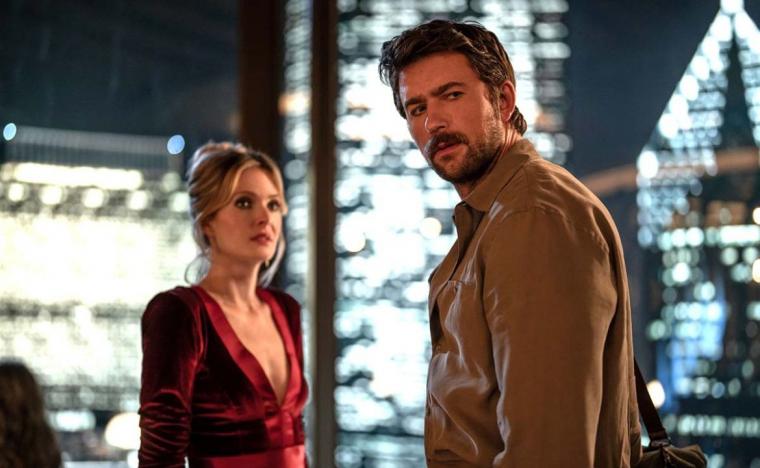
Beyond goosing us with a divinely juicy, divinely preposterous premise, Landon does a first-rate job of showing off, visually, as augmentation to the heightened danger; not only do the threatening words on Violet's iPhone pop on-screen in huge block letters, but when they're viewed as part of a mirror image, the text is displayed backwards. Ben McCreary's nimble editing is knife-edge sharp, causing me to legitimately gasp on a good half-dozen occasions in the final 15 minutes. And while I relished every minute spent with Sklenar, who's as warm and emphatically huggable as he was in last summer's It Ends with Us, that cinematic crush pales in comparison to the one I currently have on Ms. Fahy, who, as of this writing, I feel needs to be in every movie released from now through the end of time.
This, by the way, was the exact same reaction I had to a performer after the mere-months-apart two-fer of Speed and While You Were Sleeping back in the day, and it isn't exaggeration to say that Fahy appears to share all of the qualities that made Sandra Bullock a star in the mid-'90s: immediate and unforced relatability; radiant yet down-to-earth beauty; emotional transparency; obvious intelligence and common sense; a biting sense of humor; seemingly effortless romantic rapport with whomever she's rapport-ing with; the ability to make you cry simply by watching her cry. If this is coming off as more of a love letter than a review, I'll cop to that the same way I'll admit to adoring every nanosecond of her profoundly silly, deliriously entertaining star-on-the-rise vehicle. Its title is Drop, and I totally fell for it.








